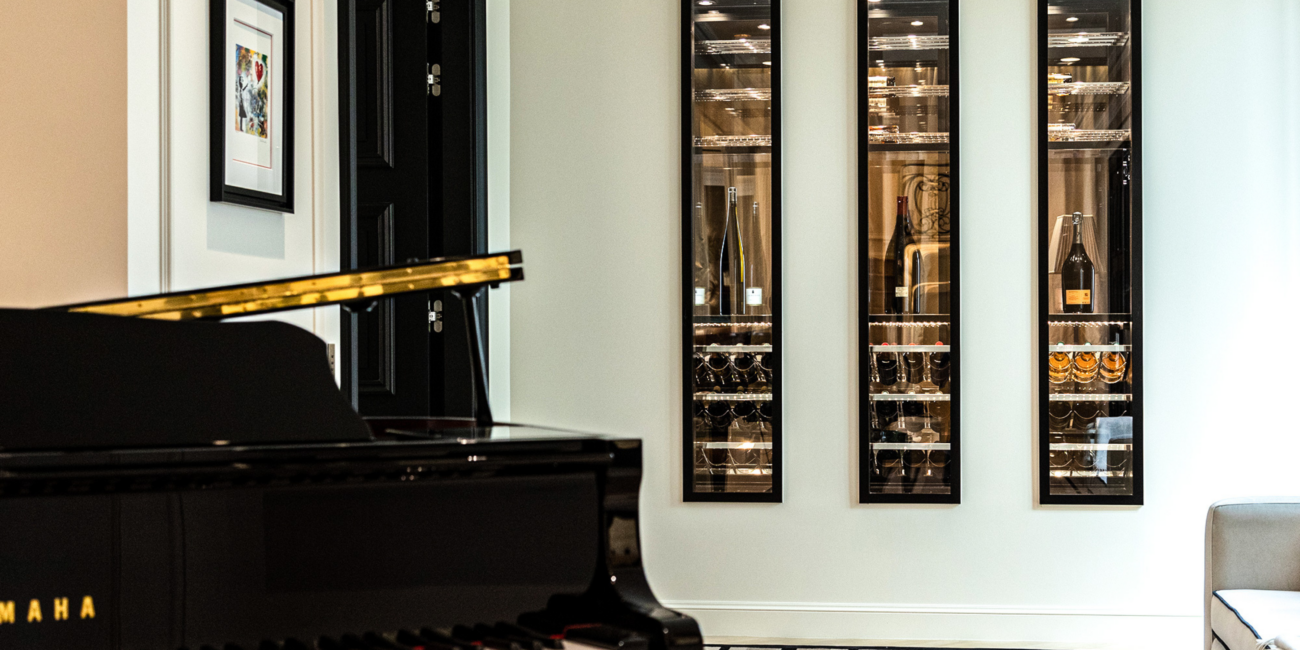
Managing Ventilation: The Delicate Art of Maintaining Freshness in Your Custom Wine Cellar
Ventilation is often an underestimated aspect of managing a custom wine cellar. However, it is a key factor in maintaining the freshness and quality of stored wines. Poor ventilation can lead to irreversible consequences for wine preservation, while proper airflow management can greatly contribute to the long-term preservation of the bottles.

The Importance of Good Air Circulation
Air circulation in a wine cellar is essential for several reasons. First, it prevents the buildup of unwanted odors. Wines, especially those sealed with corks, are sensitive to surrounding smells. A poorly ventilated cellar can accumulate musty, moldy, or damp odors that can transfer to the wine through the cork, altering its aroma and quality.
Good air circulation also helps maintain the integrity of the corks. Cork is a natural, porous material that needs to stay slightly moist to preserve its elasticity. If it dries out, it can shrink, allowing air to enter the bottle and oxidize the wine. Conversely, too much humidity can promote mold growth on the corks and labels. An effective ventilation system ensures a constant airflow, avoiding excess moisture and extreme fluctuations.
Lastly, in a custom wine cellar, ventilation helps prevent stagnant air. In confined spaces, stagnant air can create a microclimate conducive to the proliferation of mold and bacteria, which can harm both the storage environment and the bottles themselves. A well-ventilated cellar thus ensures a stable and healthy environment, essential for proper wine preservation.
Modern Ventilation Solutions
Technological advances have led to the development of sophisticated and discreet ventilation solutions for custom wine cellars. These systems are designed to ensure effective air circulation without altering the stable temperature and humidity conditions needed for optimal wine preservation.
- Integrated Ventilation Systems: Modern wine cellars often come with integrated ventilation systems that provide regular air renewal. These systems can be programmed to operate at regular intervals, maintaining a controlled atmosphere. They are usually quiet and designed not to disrupt the cellar environment, thereby avoiding sudden temperature and humidity changes.
- Air Filters: Some ventilation systems are equipped with air filters that remove unwanted particles such as dust, pollen, and other contaminants. This ensures that the air inside the cellar remains clean and fresh, minimizing the risk of wine contamination. Filters need to be regularly maintained and replaced to guarantee their effectiveness.
- Automated Humidity Control: Ventilation and humidity control go hand in hand in a wine cellar. Modern ventilation systems can be combined with humidity control devices that continuously monitor and adjust the ventilation based on humidity levels. This automated process helps maintain an optimal humidity range (usually between 60% and 75%), which is essential for preserving corks and bottle integrity.
- Passive Air Circulation: In some cases, particularly for natural or semi-underground cellars, ventilation can be ensured passively using strategically placed ventilation grilles. These grilles allow air to circulate freely while preventing strong drafts that could disrupt the internal temperature. This simple and effective method is particularly suitable for small cellars where a mechanical ventilation system would be unnecessary.
The Impact of Ventilation on Wine Preservation
Proper ventilation directly impacts the long-term preservation of wines. It helps maintain a stable environment, which is crucial for allowing wines to age harmoniously. Poor ventilation, on the other hand, can have disastrous consequences: mold growth, cork deterioration, odor buildup, and alteration of wine aromas.
- Prevention of Mold: A poorly ventilated and overly humid environment promotes mold growth. Mold can form on corks and labels and, in the case of prolonged contact, can even penetrate inside the bottle. Adequate ventilation helps prevent this problem by maintaining controlled humidity levels and regularly renewing the air.
- Elimination of Musty Odors: Stagnant odors are another danger for a wine cellar. An improperly ventilated cellar can develop musty odors, which can then transfer to the bottles. Good ventilation eliminates these odors, ensuring that the wine retains its original aromas without alteration.
- Environmental Stability: Ventilation also helps maintain a uniform temperature throughout the cellar, preventing the formation of hot or cold air pockets. This stability is crucial for wines to age in optimal conditions, avoiding thermal shocks or sudden humidity fluctuations.
Best Practices for Optimal Ventilation
To ensure effective ventilation in a custom wine cellar, here are some practices to follow:
- Install an Appropriate Ventilation System: Choose a ventilation system that suits the size and location of your cellar. For large cellars, an automated ventilation system with humidity control is often recommended. For smaller cellars, well-designed passive ventilation may suffice.
- Maintain Filters and Equipment: If your cellar has a ventilation system with filters, make sure to clean and replace them regularly. A clogged filter will no longer be effective and could even become a source of contaminants.
- Regularly Monitor the Environment: Install a hygrometer and thermometer to monitor conditions inside the cellar. Abnormal fluctuations in humidity or temperature may indicate a ventilation problem that needs to be addressed quickly.
- Organize Spaces to Promote Air Circulation: Avoid overcrowding shelves and racks. Leaving enough space between bottles allows air to circulate freely and evenly throughout the cellar.
In Conclusion: Ventilation, a Balance to Achieve
Ventilation is essential for the proper preservation of wines in a custom cellar. Although sometimes overlooked, it plays a crucial role in creating a stable, clean, and healthy environment for wine aging. Whether it’s preventing mold, eliminating odors, or protecting corks, proper ventilation management is one of the keys to ensuring that every bottle retains its character and quality.







Leave a Reply